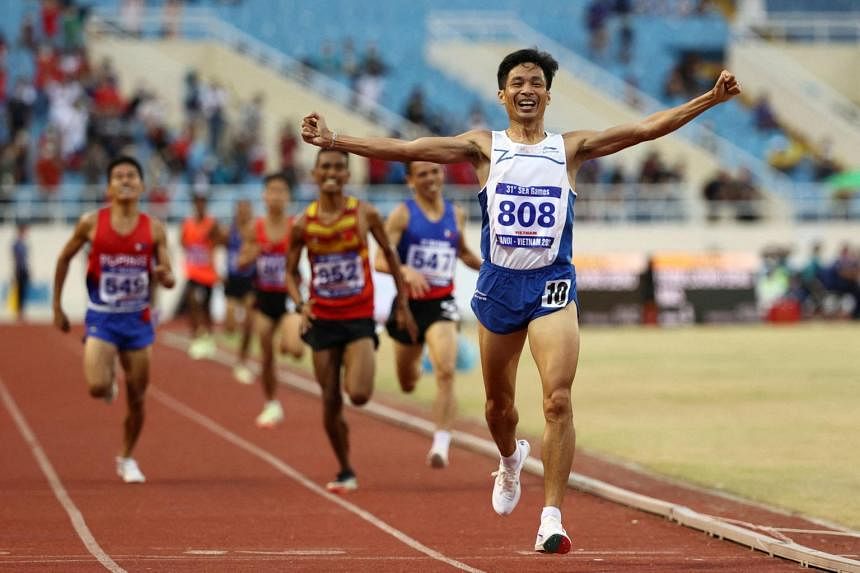HANOI - On Sunday (May 15), at the end of two days of track and field action at the SEA Games, the medal table in the sport made for now-familiar reading: with the host nation on top.
Having played bridesmaids to Thailand for almost two decades, Vietnam finally usurped their rivals to emerge the top nation in athletics in Kuala Lumpur in 2017.
They followed it up with another table-topping show two years later in the Philippines, and are looking to make it three in a row now the biennial multi-sport event has returned to the Vietnamese capital for the first time since 2003.
The hosts are aiming for at least 15 gold medals out of 47 on offer and have already won nine, nearly double that of the Thais, who are the next-best nation with five.
Nguyen Manh Hung, general secretary of the Vietnam Athletics Federation, said that their recent rise is a result of a heavy focus and investment which the nation's Ministry of Culture, Sports and Tourism placed on Olympic sports in 2015.
Some VND100 billion (S$6 million) was pumped into the project, which aimed to deliver medals at the 2016 and 2020 Olympics, as well as the 2018 Asian Games.
"We made sure we had long-term objectives and detailed plans to invest in and develop athletes," said Hung. "At the same time, we also developed a programme for young talents who are still in school."
That outlay paid off.
At Rio 2016, shooter Hoang Xuan Vinh delivered Vietnam's first gold medal and two years later, Quach Thi Lan (400m hurdles) and Bui Thi Thu Thao (long jump) delivered the nation's first triumphs in track and field at the Asian Games in Indonesia.
These wins, journalist Hoang Duy Anh said, were "so meaningful" to the nation.
Noting that Thi Lan and Thi Thu Thao both used the regional Games as a stepping stone, he added: "The SEA Games are still seen as a very important (platform) to give Vietnam more chances to build toward better results at the Asian level and beyond."
But Thailand are not sitting still and with the SEA Games returning to Bangkok in 2025, they are out to reclaim their supremacy and pride. In Hanoi, they have targeted at least 12 gold medals.
Philippine track and field national coach Jeoffrey Chua said sustained financial support for track and field stars is what has helped Vietnam and Thailand emerge as the leaders in the region over the past two decades.
"They have a very strong club system, and these clubs are supported financially by private corporations and sponsors," said Chua. "Because of this, they always have a pool of athletes they are developing for the next three or four years.
"In our situation (in the Philippines), our government funds the athletes so we are only able to maintain a few... So this aspect is key."
Former sprinter Gary Yeo, now Singapore Athletics' vice-president (training and selection), agreed and noted that this level of financial support has allowed the region's top dogs to send their athletes for frequent training and competition stints in Europe, where they have been able to gain invaluable exposure.
"They are able to send whole teams, while other countries like us have been trying to support our individual athletes for these trips," said Yeo, 35, a four-time SEA Games silver medallist who hung up his spikes in 2015. "They have been doing this since I was running."
Hung is hopeful the current crop of champions "can be an inspiration to the young talent" as the nation has big ambitions in athletics.
"We have two phases of our plan," he said. "The objective in Phase One is to win gold medals (regularly) at the Asian level by 2030.
"In Phase Two, which is an even longer-term plan, we hope to have athletes who can make special performances in the Olympics and win a medal by 2050. And we are going to invest and train groups of athletes to reach this objective."


